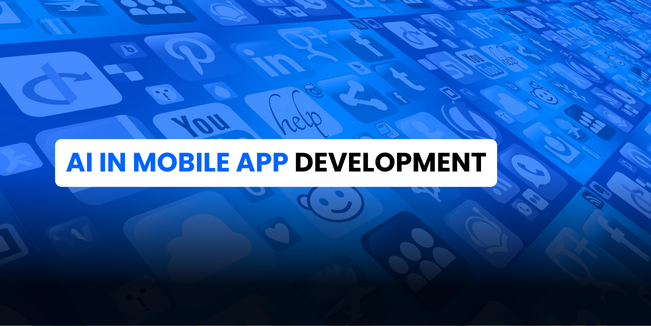ai
mobileapp
mobileapp
mobiledevelopment
Harnessing the Power of AI in Mobile App Development

As Artificial Intelligence (AI) continues to evolve, mobile app development has been profoundly impacted, revolutionizing the way apps are created and providing users with a variety of new experiences. Imagine what AI-powered mobile applications can bring - predicting user needs, understanding their preferences and accommodating all wishes. That’s the immense potential these unique software offer us! Are you prepared to dive into this exhilarating world of AI powered innovation?
Key Takeaways
-
AI-powered mobile apps are revolutionizing user experiences with personalized features, enhanced engagement and increased efficiency.
-
Challenges such as data privacy and security must be addressed for successful AI integration into mobile apps.
-
Outsourcing to experienced experts provides businesses access to specialized expertise, cost savings, scalability & faster time-to market.
The Rise of AI in Mobile App Development

The advent of AI has transformed the landscape of mobile app development, ushering in a new era that changes how applications are created and utilized. By fusing AI into apps, developers can through data science gain an understanding about user behaviors to deliver highly tailored experiences that attract customers for businesses outsourcing AI software development. The adoption rate of this technology is rapidly increasing as its competitive edge and capability to boost user engagement is being recognized by many companies worldwide.
From voice recognition systems to machine learning algorithms, mobile app developers have access to novel tools enabling them craft effective solutions with improved UI/UX design outcomes than ever before, thanks largely due partly from now accessible advanced artificial intelligence powered capabilities!
Evolution of AI in Mobile Apps
In the initial days of app development, potentialities were considerable but AI was not widely employed. When Siri from Apple came in with its voice-assisted feature powered by Artificial Intelligence (AI), it revolutionized mobile interaction and cleared a path for more complex applications like Fyle that uses Optical Character Recognition (OCR), ML & NLP to offer unique solutions.
Nowadays, due to leaps made in the field of AI technologies such as personalized user experience through analyzing users’ behavior pattern or demographic data etc., apps have started becoming responsive according their personal preferences allowing them to alter content layouts dynamically depending on specific profiles.
With continuous developments being done in AI integration we can expect even better results leading towards delightful and customized UX/UI experiences solely dedicated towards each person using these smartly designed phone programs
Market Growth and Adoption
The AI-powered mobile apps market is undergoing a huge expansion, as businesses are leveraging this technology to get an advantage and improve user experience. Incorporating Artificial Intelligence in mobile applications offers several benefits such as personalization features, improved customer engagement, and enhanced efficiency.
For example, Vanguard’s use of intelligent agents which can help customers answer their questions demonstrates the potential power that using these technologies have on the overall app landscape by providing competitive advantages for organizations who implement it successfully.
Key AI Technologies Transforming Mobile Apps

The mobile app development landscape is being transformed by the introduction of three AI technologies: machine learning, natural language processing and computer vision. This has led to the production of impressive ai powered mobile apps such as fitness applications that analyze user activity in order to provide personalised advice. E-commerce software which suggests products dependent on customer preferences and gaming programs with adjustable difficulty levels adapted based predictive analytics and on user engagement.
These new ai technologies are revolutionizing how developers approach creating modern day apps making them far more intuitive for end users while leveraging these amazing toolsets to enhance their experience even further!
Machine Learning
The application of machine learning in mobile app development has the potential to transform how users interact with these apps. Artificial Intelligence (AI) powered capabilities enable developers to create experiences tailored according to user preferences, behavior and demographics, leading to improved engagement. Through data analysis and by observing user interactions AI can learn from past app performance and then fine-tune features for a more intuitive experience that boosts satisfaction levels among customers. Mobile apps combining advanced Machine Learning techniques are equipped with powerful tools allowing them leverage insights taken from their environment into valuable outcomes resulting in enhanced usage rates overall.
Natural Language Processing
NLP is an important component of AI, used to enable machines to comprehend and respond appropriately in human language. This technology allows applications to interact with users through natural conversation or voice commands, as well as interpret text messages for personalized recommendations, all this leading towards enhanced user experience.
AI-powered mobile apps use NLP capabilities which facilitate effortless conversations between the app and its end-users. Such convenience holds particularly true when it comes specifically down business management and finance activities that require quick answers or advice from the application via voiced or textual queries.
The advantages afforded by utilizing Natural Language Processing are evident: not only does the tool allow mobile applications be more interactive but also ensures a higher degree of satisfaction among their customers by providing better customer service tailored depending on each individual’s needs.
Computer Vision
Computer vision technology has been revolutionary for mobile app development, providing users with captivating and immersive experiences. The use of advanced algorithms and models allows AI-powered apps to accurately pinpoint and recognize various objects in both images or video frames. This can be seen when applications utilize facial recognition as well as object detection technologies.
Mobile apps are able to identify and process image content more seamlessly using computer vision tools which enhance user experience through augmented reality capabilities too. Overall, this cutting edge technology is making a major impact on the design landscape allowing for exciting interactive opportunities between an application’s audience base .
Advantages of Integrating AI into Mobile Apps

AI-enabled mobile applications can bring a number of advantages, such as enhancing user experience and increasing development productivity. They are able to analyze customer behavior and tailor the content accordingly for increased engagement rates. AI integration in apps could lead to automation that ultimately streamlines procedures while reducing manual labour requirements. With its abilities, businesses have access to create captivating yet efficient apps which reflect changing consumer wants accurately It should be noted that all these features coupled with improved overall app functionality may finally result from leveraging AI powered technology into mobiles devices .
Enhanced User Engagement
Mobile apps that are powered by AI have the capacity to examine user behavior and adjust their content according to individual requirements, enabling them to gain insight from past experiences in order to implement ai for users to receive tailored materials. This degree of personalization significantly affects engagement and satisfaction levels as customers become more engaged when they find an app which caters precisely for their needs based on preferences or interests. For this reason, ai-powered mobile applications show potential regarding augmenting customer involvement alongside loyalty towards using such products while also maximizing usage.
Personalization
Mobile applications that are powered by AI offer a more relevant and enjoyable experience for users, through tailored content based on individual preferences. This includes the delivery of personalized recommendations, customized user interfaces, special notifications as well as improved search results, all serving to improve customer satisfaction while simultaneously enhancing engagement with those using such apps.
AI algorithms can comprehend behavior patterns and demographics of app users in order to dynamically adjust elements like layout features or contents according to each unique profile. Which is attractive both from an end-user standpoint but also helpful businesswise due its capability of boosting interaction with audiences leveraging mobile apps supported by artificial intelligence technology.
Increased Efficiency
The integration of AI technology has the potential to significantly boost efficiency within mobile apps, by automating mundane tasks such as data entry and content moderation. This allows developers to channel their efforts into more complex problem solving scenarios. Ai-enabled applications can learn from user behavior analysis and adapt accordingly. Thereby allowing businesses to create smarter solutions that anticipate customer needs on an ongoing basis. Powered with virtual assistants and bots powered by artificial intelligence makes it easier for companies to stay up-to-date in terms of app development processes while also remaining responsive towards individual consumer preferences..
Real-World Examples of AI-Powered Mobile Apps

Mobile applications powered by AI have substantially shaped many industries, delivering personalized and very engaging experiences to users. These ai technologies are revolutionizing the way in which mobile apps are constructed and utilized. From health related activities being monitored with user specific instructions given accordingly for e-commerce websites curating based on individual preferences. Notably, gaming companies particularly capitalize on this transformation as Artificial Intelligence technology makes it possible to adjust difficulty levels depending upon skill level of player involved at any moment during playtime while pitting virtual rivals against each other simultaneously creating enjoyable storylines that maximize engagement among players better than ever before since the dawning age of artificial intelligence assisted app usage rise significantly over time.
Health and Fitness Apps
AI-driven health and nutrition apps are an excellent example of how artificial intelligence can be leveraged to give users personalised training regimes, dietary guidance, and accurate tracking for improved results. Through analysing user data AI applications in the fitness arena provide important insights as well as recommendations that enable people reach their physical goals more efficiently. Popular examples include Aaptiv, FitnessAI Fitbod Freeletics & Vi Trainer. Each showcasing just what AI is capable of when it comes to providing tailored plans for optimal wellbeing outcomes with a simple yet powerful approach .
E-commerce Apps
AI integration has proved incredibly beneficial for e-commerce apps, allowing them to track and study user behavior as well as analyze their preferences. This allows the app to provide personalized product recommendations along with promotions tailored specifically based on users’ likes or dislikes. AI algorithms can effectively curate content that fits best according customer choices in order to produce a more enjoyable shopping experience.
Examples of successful AI integrations by popular E-Commerce applications are: eBay, TUP Ecommerce, Wacul-AI Granify Seventh Sense , PriSync NeoWize and ViSENZE . All these have embraced the power of Artificial Intelligence so they could give out customized offers at an individual level which ultimately results in increased sales turnover due its enhanced end user engagement rate .
Gaming Apps
By integrating AI technologies, gaming apps have become even more engaging for users. This technology allows developers to craft virtual opponents and adaptive difficulty levels that can be customized according to individual preferences and skills. Popular examples of this are AlphaGo Zero, Promethean AI, and Stockfish – all providing an immersive experience through their dynamic storylines which helps increase user enjoyment of the game. With these intelligent features in place it is easy to see how they improve upon traditional games by enhancing engagement with players no matter what their level may be or what kind of challenge they desire.
Challenges and Considerations in AI Mobile App Development

Developers and businesses need to consider several elements when creating ai powered mobile apps, including data privacy & security considerations as well the costs of development & integration with existing systems. Addressing these challenges allows companies to improve their engaging experience in terms of user needs and preferences plus gain advantages over rivals in this fast-changing landscape. AI mobile applications enable more efficient interactions for users while providing them greater flexibility than traditional ones do. Making it an attractive option that could give competitive edge over competitors in search rankings or revenue streams.
Data Privacy and Security
Developers of ai powered mobile apps must prioritize data privacy and security when it comes to their app development. Encryption should be used in order to protect user information, consent from the user needs to be obtained before collecting personal info and only necessary data for functionality of the app will do. Measures have been taken so as not to allow unauthorized access regarding storage settings being secure.
In other words, developers are able by following these suggestions make sure that AI-enabled mobile applications provide an enjoyable experience while keeping users trust via protecting valuable sensitive details simultaneously. Proactive initiatives can help ensure any android app development is safe with respect toward guarding private facts associated with them .
Development Costs
Developing AI-powered mobile apps can be quite costly due to the sophisticated technology and specialized skills needed. Based on its features, creating an AI app may cost anywhere between $40,000 and $100,000.
Businesses must take into account potential advantages of utilizing this tech such as increased engagement with users through personalization or improved efficiency when deciding their budget for it. A smart use of resources in development paired up with leveraged benefits from incorporating Artificial Intelligence should help companies create more user friendly applications that meet ever evolving needs and preferences effectively.
Integration with Existing Systems
Integrating AI technologies into existing systems and processes can be a difficult undertaking that may require custom-built solutions or third-party tools. Developers must carefully consider the challenges associated with adding AI to their mobile apps, deciding on which instruments are most suited for ensuring an effortless integration of these technologies within current frameworks.
Succeeding in this endeavour enables companies to gain advantages over other players by delivering more attractive, useful and user friendly applications as well as keeping up with ever changing trends while providing users with all necessary resources they look for .
Outsourcing AI Software Development for Mobile Apps

When outsourcing the development of AI-powered mobile apps, businesses can expect to benefit from specialized expertise and cost savings as well as faster timeframes. A skilled outsourced partner can bring their extensive knowhow in this field which helps companies to stay ahead of competitors with cutting edge tech advancements. The resources that are saved by these measures may then be devoted towards other strategic ventures or growth goals. Working on app projects through outsourcing promises high quality results while enhancing a business’s competitive advantage among its rivals in the ever changing landscape for mobile applications.
Access to Specialized Expertise
By outsourcing their AI app development needs to professionals like mDevelopers, organizations are able to take advantage of specialized know-how and best practices that guarantee top-notch outcomes. Partnering with a seasoned external provider allows companies the chance to benefit from expert passion, expertise, and knowledge when creating an AI powered mobile application.
Working alongside these pros offers vital insights not only for this specific project but which can be used across many others as well as in other strategic efforts– delivering real value long after it is deployed.
Cost Savings and Scalability
Outsourcing AI app development can provide businesses with a competitive edge in the quickly advancing mobile app landscape. It comes with flexibility, access to high-level professionals and cost savings which enable companies to divert their resources toward new growth initiatives as well as other strategic activities. With outsourcing for software application development, firms have the capacity to build top quality AI driven apps quicker than before while also optimizing their budgeting constraints..
Faster Time-to-Market
Outsourcing AI mobile app development has the potential to help businesses stay ahead of their competition by allowing them to get their products on the market in less time. This facilitates increased revenue and sales, while giving companies an edge over those who don’t adopt this method. Partnering with a professional application developer is likely to give them even more speed when it comes to getting these high-powered, intelligent apps out out there for use.
Duelling with others in such a dynamic industry requires that companies leverage any resources they have available. Outsourcing may be just what business need if they want move quickly and maintain relevance within the ever evolving landscape of mobile applications powered by artificial intelligence (AI).
Summary
App developers can use AI technologies such as machine learning, natural language processing and computer vision to build engaging mobile apps that deliver unbeatable user experiences. Even though data privacy concerns, development costs and system integration may pose a challenge, the advantages of incorporating AI in your next mobile app market or project will make up for it with increased engagement levels amongst users. Mobile app development has been drastically changed due to the rise of advanced artificial intelligence capabilities, take advantage now!
Frequently Asked Questions
How AI is used in mobile applications?
AI has made a profound impact on our day-to-day lives, especially in terms of mobile applications. Using AI technologies such as Voice Assistants and Natural Language Processing, we can access personalized recommendations. It also provides us with tools to identify images and videos swiftly, even intelligent chatbots.
Thanks to the emergence of AI technology there is an enhanced level of convenience when interacting with tech devices, tasks which may have taken longer periods before are now completed more efficiently due to automation processes enabled by this toolset. From something so complex yet powerful as natural language processing embedded within many modern applications down through basic picture and speech recognition capabilities, all combined allowing for easier user experiences than ever before possible!
What is an example of AI in mobile?
The use of Artificial Intelligence (AI) in mobile devices has been gaining a lot of traction, especially with voice-based control systems such as Siri and Cortana. These allow users to talk normally into their phones which are then converted by the computer into language that
Can AI create a mobile app?
AI can produce a mobile application that enables users to efficiently create Android or iOS applications and boost user experiences in ai apps in an economical manner. This app will help streamline processes, all at the same time maintaining the tone of original text.
What are the key AI technologies revolutionizing mobile apps?
Ai technologies like machine learning, natural language processing and computer vision are leading the charge in modern mobile apps by providing faster and more precise user experiences. This revolution is being driven by these cutting-edge ai innovations.
How can AI enhance user engagement in mobile apps?
AI has the potential to boost user engagement, by giving personalised experiences, analysing data related to users and tweaking features so they have more fun with their app.